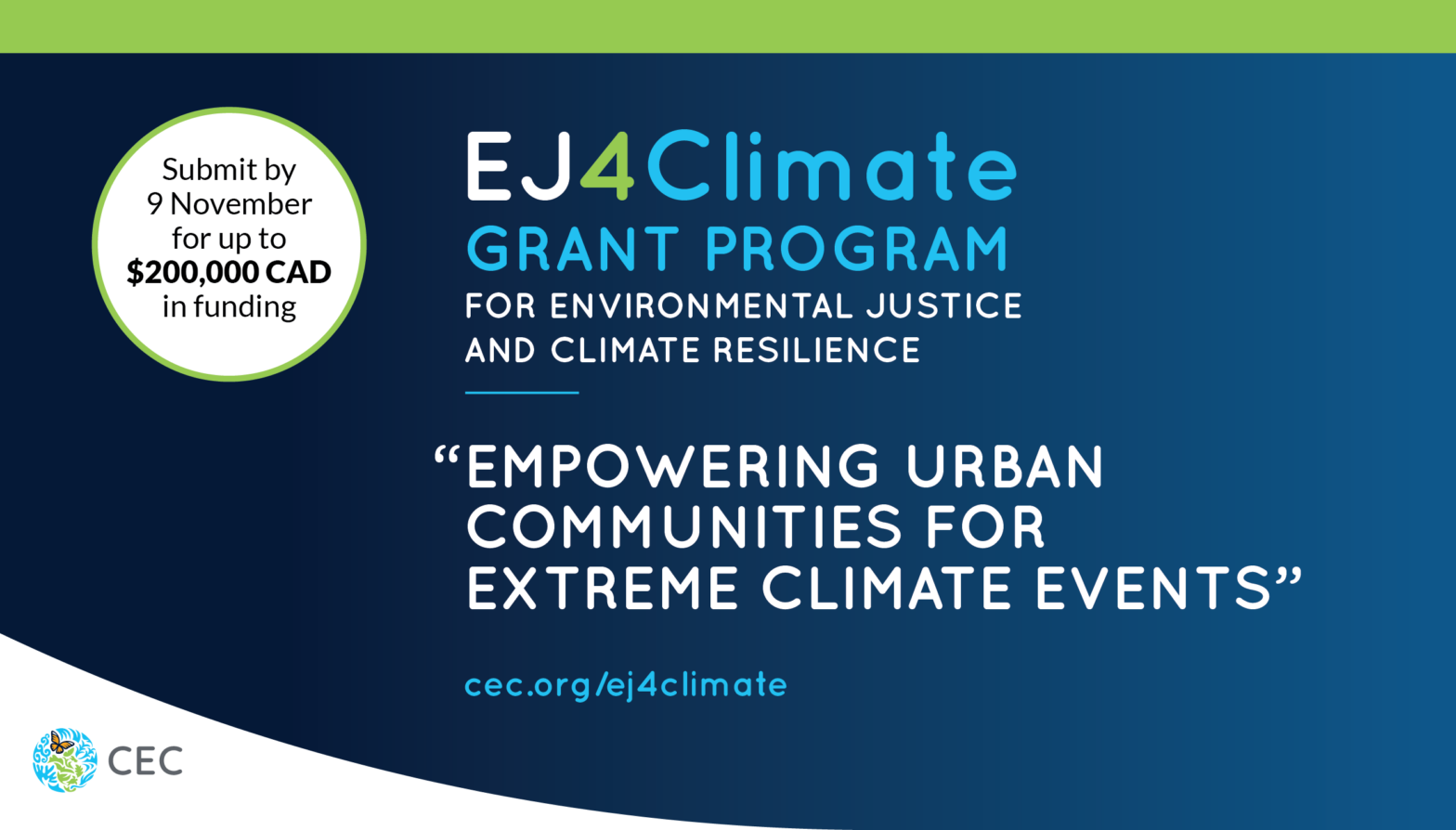New EJ4Climate Grant Program Cycle Open for Applications: US$2M Available for Communities’ Climate Resilience
Montreal, 19 September 2023—The Commission for Environmental Cooperation (CEC) is excited to announce that the third cycle of the US$2 million Environmental Justice for Climate (EJ4Climate) Grant Program is now open for applications for projects on “Community empowerment strategies to improve resilience to extreme weather events in urban settings,” with up to C$200,000 in grant funding available for recipients.
Initiated by US Environmental Protection Agency (EPA) Administrator Michael S. Regan in 2021, the EJ4Climate Grant Program is dedicated to empowering underserved and vulnerable communities, and Indigenous communities, across North America, to help prepare them for climate-related impacts.
The EJ4Climate Grant Program has been a driving force behind community-based organizations and individuals at the frontline of climate action, supporting solutions to adapt to the impacts of climate change. Since its inception, the program has received more than 700 submissions and awarded funding to 29 recipient projects to help communities in Canada, Mexico and the United States. For this grant cycle, the CEC is calling for project proposals that will advance community-driven strategies in support of environmental justice and community resilience to the impacts of extreme weather events in urban areas.
“It’s critical that we tackle our current triple planetary crisis of climate change, pollution and biodiversity loss as aggressively and as effectively as possible, but most importantly, that we do it in a way that helps reverse inequitable environmental burdens that many communities have faced,” said Jorge Daniel Taillant, CEC Executive Director. “Effective climate action must build climate resilience, help climate vulnerable communities adapt to the intensifying impacts of climate change and must help right historical wrongs.”
Home to approximately 80% of North America's population, urban areas are at the forefront of climate change impacts. The 2023 grant cycle seeks projects that empower communities and individuals to tackle extreme weather events, reduce health and economic disparities, and drive sustainable change. The community-driven strategies will integrate empowerment as the main principle to support and enable communities and individuals with heightened risk and increased sensitivity to climate change to gain more influence and implement long-lasting solutions to strengthen resilience to extreme weather events.
The grant program welcomes proposals that foster climate resilience by improving the capacity of overburdened communities in urban areas (cities, towns and suburban or peri-urban areas) to prepare for, withstand, respond to, and/or recover from hazardous events or disturbances related to climate change, which pose risks to human and environmental health, cultural resources, the economy, and quality of life. Possible projects under this grant program could include specific capacity building or training to address extreme weather impacts, developing new partnerships and networks or utilizing nature-based solutions to address climate change. Eligible applicants range from non-profit and non-governmental organizations (NGOs), civil society groups, environmental groups and community-based associations to faith-based organizations, tribal nations, and Indigenous Peoples and communities.
Proposals are due by 9 November 2023 and projects will be expected to begin in Spring 2024.
Learn more about the EJ4Climate program and selection criteria, view recipient projects and access the online application portal here.
For updates about CEC initiatives and news, sign up for our newsletter and follow us on social media.

About the CEC
The Commission for Environmental Cooperation (CEC) was established in 1994 by the governments of Canada, Mexico and the United States through the North American Agreement on Environmental Cooperation, a parallel environmental agreement to NAFTA. As of 2020, the CEC is recognized and maintained by the Environmental Cooperation Agreement, in parallel with the new Free Trade Agreement of North America. The CEC brings together a wide range of stakeholders, including the general public, Indigenous people, youth, nongovernmental organizations, academia, and the business sector, to seek solutions to protect North America’s shared environment while supporting sustainable development for the benefit of present and future generations
The CEC is governed and funded equally by the Government of Canada through Environment and Climate Change Canada, the Government of the United States of Mexico through the Secretaría de Medio Ambiente y Recursos Naturales, and the Government of the United States of America through the Environmental Protection Agency.